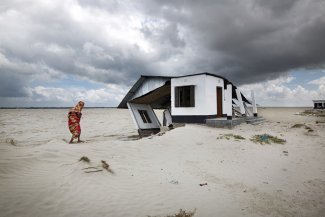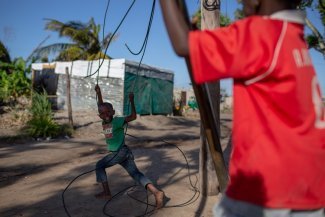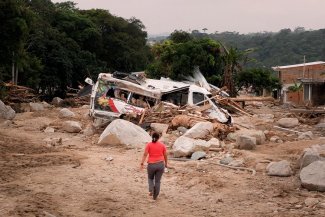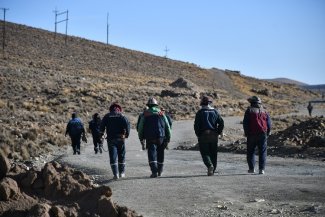People wade through a flooded area in Sewan Sharif, southern Sindh province, Pakistan on 6 September 2022. Monsoon rains and melting glaciers in Pakistan’s northern mountains have brought floods that have affected 33 million people and killed at least 1,300, including 458 children.
Pakistan has experienced a cruel summer this year. Starting in June, floods of unprecedented severity began devastating the country. By September, a third of Pakistan was under water, over 1,300 people were dead, and as many as 30 million people are estimated to have been made homeless. The waters are not expected to recede for another six months, resulting in a loss of arable land. On top of that, the country is reeling from a hike in fuel prices, backbreaking inflation, an energy crisis and massive food insecurity, exacerbated by the war in Ukraine.
The international community has offered help: the World Health Organization (WHO) has released US$10 million from its emergency fund to support relief efforts. The World Bank has announced US$350 million, the World Food Program US$110 million and a host of other countries including the United States, the United Arab Emirates, Turkey and China have offered millions in donations. However, this falls short of the US$10 billion Pakistan’s government says is needed to rebuild affected regions.
Additionally, there is a growing sense of injustice in the country. Pakistan contributes less than 1 per cent of global greenhouse gas emissions, and yet it is one of the countries that is most vulnerable to the impacts of climate change. A growing movement of climate activists and relief workers in Pakistan are demanding climate reparations as a way of holding big polluters in the Global North accountable. They hope to challenge the language of charity that obscures the issue at hand: climate justice. As a term, ‘climate reparations’ is a conduit for a broad range of ideas and critiques that wish to connect climate justice to other forms of injustices, economic and social.
Centuries in the making
Pakistan is particularly vulnerable to climate change not only because of its weak economy and infrastructure, but also its geography. It is located in a region that bears the brunt of two major weather systems: one that can cause droughts and heatwaves, the other brings monsoon rains. Both weather systems have become increasingly unstable over the last few decades and the escalation in severity is consistent with climate science.
Pakistan is also “home to the highest concentration of glaciers [over 7,200], more than anywhere in the world except the Poles,” explains Ammar Ali Jan, a historian, activist and council member of Progressive International, an organisation that aims to unite the global left.
“This crisis has been centuries in the making and part of the problem can be attributed to the criminal incompetence and indifference of our own state,” says Jan.
“Even at the peak of these floods, the country was distracted by sensational and bitter political battles between the ousted leader Imran Khan, the succeeding Shabaz Sharif-led government and the military. The whole spectacle was grotesque considering that one-third of the country was under water.”
However, Jan believes that the true cause of this crisis is the culmination of historical global processes that have condensed into a seemingly sudden emergency. “One of the problems of a globally induced climate crisis is that it is very difficult to narrate. You don’t have obvious heroes and villains because the processes that happened in the 19th and 20th centuries are reaching a crisis point now.” This kind of temporal and spatial lag between when and where the emissions were released and when and where the floods came allows for all kinds of misinterpretations. For example, many people affected by the floods don’t link it to human activity.
“I think that’s why when we narrate these events it’s very important to identify the culprits,” he tells Equal Times. “Twenty fossil fuel companies are responsible for over a third of all global greenhouse gas emissions in the last half-century and they knew things were going to get very bad. Their own research found evidence linking fossil fuels to climate change almost 40 years ago, but they buried it to promote misinformation instead. These companies must be punished for the damage they have caused.”
“They should be paying us, not the other way around”
Half of the greenhouse gas emissions in our atmosphere were released after 1988, well after Exxon had discovered the catastrophic effects of fossil fuel consumption. Had such companies been upfront about it at the time, we might have transitioned smoothly towards sustainable energy sources earlier. Ali Jan argues that it would be appropriate to raise a portion of reparations by holding these companies accountable for their deception.
However, Jan is also mindful of the role states have played in enabling corporations and fast-tracking the current crisis. “Pakistan is a former British colony, and its underdevelopment is rooted in this history of extraction and exploitation. But generally speaking, the Global North has used corporations and various financial instruments at its disposal to perpetuate a debt crisis.”
For as long as any Pakistani can look back, the country has been in the stranglehold of the International Monetary Fund (IMF) whose ‘structural readjustment’ programmes have imposed deregulatory policies and higher taxes on essential goods such as fuel and energy. “Pakistan can only repay its debt at the expense of millions of its own citizens,” he explains.
According to Debt Justice (formerly known as the Jubilee Debt Campaign), low-income countries spend five times more on external debt payments than on projects to protect their citizens from the impact of climate change.
A lot of this debt was taken on by corrupt and tyrannical rulers in the Global South – a lot of whom had been approved by the Global North during the Cold War and the War on Terror. As Farzana Faruk Jhumu, a Bangladeshi climate activist, says: “They should be paying us, not the other way around”.
The Global South also needs funds to finance green initiatives but in 2019, 71 per cent of climate finance was loan-based. Loans come with interest, which means that countries of the South end up paying money they lack to the Global North in order to mitigate the disastrous consequences of emissions produced by the Global North. Needless to say, this further exacerbates the inequity divide between the North and South. The demand for reparations in the form of debt cancellation rejects climate finance as either a favour or a loan: it calls it a right.
“There are many catastrophes waiting in the shadow of the floods”
Muzammil Khakar – a Lahore-based student activist and coordinator of the progressive and grassroots Haqooq-e-Khalq Party – hails from Killa Abdullah District, a remote border town in Balochistan. He lost his family farmland during the recent floods and part of his house suffered structural damage. “It is difficult to convey the magnitude of the crisis our villages are facing. The farms are gone just before harvest season, so farmers have lost a whole year’s worth of income. There is no electricity to pump water. Water-borne diseases are on the rise. In these remote areas, we are yet to see any relief workers; whatever work is being done, we are doing it ourselves. There are many catastrophes waiting in the shadow of the floods.”
When he went back for relief work, he found that whatever produce had been saved was rotting in long traffic jams. Balochistan is a deprived province with a very fragile infrastructure. It is a heavily militarized zone in part due to separatist movements in the area and in part due to the China Pakistan Economic Corridor development project that aims to build a trade route, connecting Chinese trade to ports on Balochistan’s coast. The project has been criticised for being a “centralising force in Pakistani politics”, snatching away whatever political autonomy Balochistan is entitled to, and depriving it of its own resources.
As many routes became impassable due to the floods, the remaining options became traffic choke-points for farmers desperately trying to reach far-flung markets. This does not bode well for a country already suffering from a nutrition crisis. “Forty percent of Pakistani children under five are malnourished. Without relief, without livelihoods to support them and with the sort of food insecurity we will see in the future, we are staring into the abyss,” says Khakar. “This is not a price we should have to pay for the excesses of the global elites. There is no one here to help us”.
Khakar says that reparations must include a transfer of technological know-how and education as well. “Our areas have been deprived of education for so long: we need schools, we need research and development, we need fairly paid jobs, and political autonomy over our resources.”
Who shall inherit the earth
Previous flood disasters in Pakistan have demonstrated that though disasters affect everyone, marginalised groups shoulder the greatest burdens. Rural-dwelling women – who tend to be married young and are often pregnant – are less likely than men to have survival skills like swimming, navigation and literacy. In the aftermath of previous floods, both maternal mortality rates and rates of early marriage were found to have risen.
Jahan Zuberi, a midwife and relief worker, recently travelled to Dadu – one of the worst flood-hit areas in Sindh – to provide medical care for expecting mothers. “Before the floods, healthcare in the rural areas was dismal. In some regions, women were either walking for one to two hours on foot to get care, delivering at home with an untrained dai (midwife), or going to government hospitals which often lack medicines and providers. The floods have eliminated what little access to care there was in the first place, increasing the rate of maternal and infant mortality,” says Zuberi.
For Zuberi, the question of climate reparations is important because “you can’t talk about climate change without also talking about the intersections of class, capitalism, patriarchy, women, and minority rights”. Any reparations that are funneled through state institutions would probably be distributed along the lines of internal rifts and inequalities. For reparations to have any meaning, Pakistan would also have to contend with its own fraught history with redistributive justice and human rights, especially concerning women and ethnic minorities.
“Yes, Pakistan contributes low CO2 emissions, but the different pillars that uphold climate change are alive and well here. The government is not doing anything special to regulate development or curb its contribution to the destruction of the environment,” says Zuberi.
Locals and activists near the glacial regions of the country have been raising the alarm on melting ice for years now,but their calls have been met with indifference, if not wrath. Dubbed the ‘climate prisoners’ of Pakistan, activists like Baba Jan and Iftikhar Karbalayi have spent years in prison, fighting dubious terrorism charges. Their crime? Organising a campaign that demanded compensation for those displaced during the 2010 and 2011 floods.
Though the Pakistani government has raised the issue of debt cancellation and reparations, former Home Minister of Sindh, Manzoor Wassan, has compared flood-affected areas in Khairpur to Venice, Italy.
Faced with such tone-deaf indifference of political authorities, there remains an open question that divides opinions among climate justice activists: would reparations be subject to audits from international monitoring institutions or would the affected states have complete autonomy over the funds? Regardless of which mechanism is opted, Zuberi believes “there needs to be a more significant movement in the country to hold the government accountable” so that corrupt and inept authorities would not be able to squander the resources or seize the decision-making power of the citizens.
Reparations: not a nationalist argument
In the aftermath of the flood, people are enduring unimaginable indignities and though relief workers are doing what they can, it is not enough given the scale of the destruction they are faced with. “The dinosaurs of politics – the figures our citizens expect to see in such disasters – are hardly visible,” says Jan. “Citizens have been shown the worthlessness of their lives in the eyes of their rulers. But in this vacuum, young progressives have jumped in and stepped up grassroots relief work and my hope is that they will emerge as the new community leaders and the architects of a just future.”
Jan, Khakar and Zuberi believe these stories demonstrate that climate reparations are not only a strategically necessary argument to recast the world’s attention on the climate crisis and its entanglements with colonialism, capitalism and patriarchy, but an appropriate mechanism for accountability and fairness as well.
However, they are also aware of the fact that activists and citizens have their work cut out for them on many fronts, locally and internationally. “The international community needs to keep the conversation going and to not forget what is happening here in Pakistan. I hope it can lead to a more extensive conversation that includes tangled actions and change from governments and corporations,” says Zuberi.
Jan says that the case for reparations must be grounded on international solidarity; expressed as a common struggle against global elites who refuse to heed the warnings of climate science.
“We are not making a Global North vs Global South argument; reparations cannot be conceptualised within the nationalist framework. They are supposed to address a global crisis. We will need progressives all over the world to put pressure on their governments, to hold emitters accountable and demand climate justice.
“We want to unite people in a common cause: saving the planet and punishing the polluters who are not only wreaking havoc here in the Global South, but also pushing the Global North towards destruction, militarism and borders.”
This might seem like a colossal task to achieve but it is not impossible. In September, Denmark broke “a taboo maintained by the world’s richest countries” and paid US$13.3 million in reparations to communities struck by climate disasters in places such as Africa’s Sahel region. It is not a lot but it’s a start. It remains to be seen if other countries will follow or if reparations would become a way of buying the right to exceed emission limits. But reparations may be successful in reorienting the world towards a more profound understanding of what climate justice means for the people of Dadu in Sindh or Killa Abdullah District in Balochistan.
“Today, being a realist means thinking radically,” says Jan. “Those who believe that the status quo is sustainable or that we can resolve our problems within the existing framework of the system – they are the utopians, not us.”













